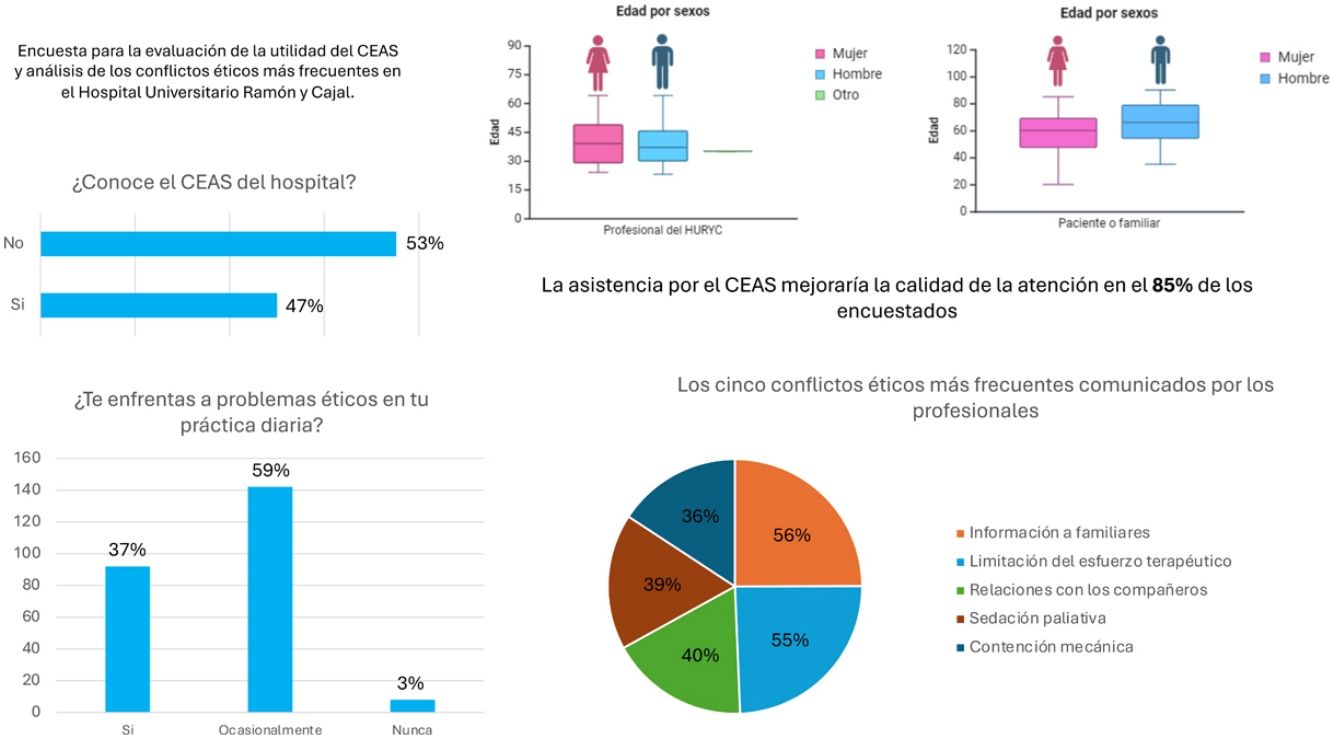The Ethics committee (EC) are an essential part of the health institutions, however, in many occasions their response capacity is slow, being organs perceived as distant from the clinical practice. This means that they receive limited consultations, leaving many decisions to the sole discretion of the physician in charge.
Material and methodsA prospective study was designed based on anonymous surveys for professionals, family members and patients attended at the Hospital Ramón y Cajal. The analysis included a description of demographic variables, information on knowledge of the EC and on ethical-health care conflicts.
ResultsBetween December 2023 and March 2024, 394 responses were received. A total of 108 patients and family members (52% patients, 48% family members) were included, of whom 46 were men and 62 were women with a median age of 64 (range 20–90). 84% considered the decision support provided by a CEAS team to be useful. 85% believed that this would improve the quality of their care. The professionals included 83 men, 202 women and 1 other (aged 23–54). The most represented groups were doctors (55%). 53% were not familiar with the CEAS. 9% had requested help from the CEAS and 19% had attended training. 48% were aware of clinical ethics consulting. 37% acknowledged facing ethical problems, resolving them by consulting a colleague (68%). 84% saw the usefulness of consulting with other professionals.
ConclusionsThis work reflects knowledge about CEAS, the needs of patients, family members and professionals, and the most common ethical conflicts in our environment.
Los CEAS son una parte esencial de las instituciones sanitarias, sin embargo, en muchas ocasiones su capacidad de respuesta es lenta, siendo órganos percibidos como alejados de la práctica clínica. Esto hace que reciban limitadas consultas, quedando muchas decisiones a criterio único del médico responsable.
Material y métodosSe diseñó un estudio prospectivo basado en encuestas anónimas para profesionales, familiares y pacientes atendidos en el Hospital Ramón y Cajal. El análisis incluyó una descripción de variables demográficas, información sobre el conocimiento del CEAS y sobre los conflictos ético-asistenciales.
ResultadosEntre diciembre de 2023 y marzo de 2024 se recibieron 394 respuestas.
Se incluyeron 108 pacientes y familiares (52% pacientes, 48% familiares) de los que 46 fueron hombres y 62 mujeres con una mediana de 64 años (20–90). El 84% consideró útil la ayuda a la decisión por un equipo del CEAS. El 85% creyeron que esto mejoraría la calidad de su atención. Los profesionales incluyeron 83 hombres, 202 mujeres y 1 otro (23–54 años). Los colectivos más representados fueron médicos (55%). El 53% no conocía el CEAS. El 9% había solicitado ayuda al CEAS y el 19% había asistido a formación. El 48% conocía la consultoría en ética clínica. El 37% reconocían enfrentarse a problemas éticos, resolviéndolos consultando a un compañero (68%). El 84% vieron utilidad en la consulta con otros profesionales.
ConclusionesEste trabajo refleja el conocimiento sobre el CEAS, las necesidades de pacientes, familiares y profesionales, y los conflictos éticos más frecuentes en nuestro entorno.
Article
Diríjase desde aquí a la web de la >>>FESEMI<<< e inicie sesión mediante el formulario que se encuentra en la barra superior, pulsando sobre el candado.

Una vez autentificado, en la misma web de FESEMI, en el menú superior, elija la opción deseada.

>>>FESEMI<<<









